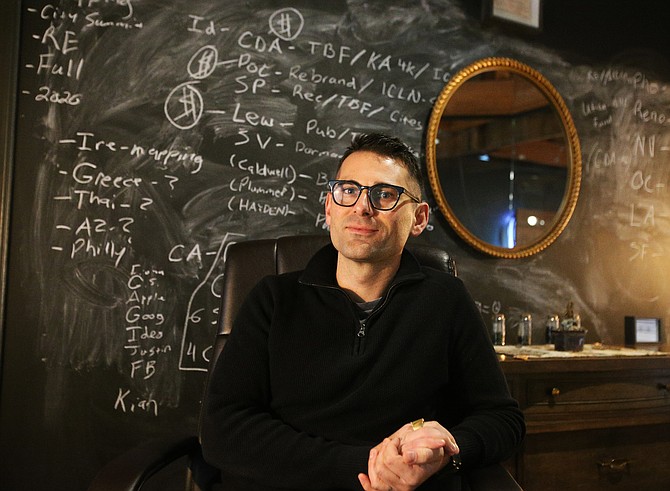Sorry, you’re not the smartest person in the room anymore

Nick Smoot, tech investor and CEO of Innovation Collective. LOREN BENOIT/BJNI
There is an old saying, “If you’re the smartest person in the room, you’re in the wrong room.”
Well, it’s now official. We are all dumber than our friend, AI.
That is its nickname and in many circles, it likes to go by Artificial Intelligence.
AI is listening and watching almost every meeting, every street, and starting to listen to our every word.
So many questions start to form... is this good? What about my privacy? Who gave this a*%hole permission to listen to me? What is it doing with this information?
Let’s dive into learning a bit more about AI. I’m going to do my best to poke and prod you into seeing the value in our dear friend AI, while also realizing that you should be careful.
To start down the rabbit hole, let’s first ask what are possible positive uses for AI.
Assisting or replacing judges in courtrooms: There’s an argument that judges will always be better than an algorithm at listening to the facts and making a decision. But is that the case? Will that be the case forever? In an MIT article, it makes an argument for AI that can be fair and possibly fairer than the current system. In The Scientific American, it proves that judges are harsher when they are hungry.
https://bit.ly/2QxaHew
https://bit.ly/2J52WIz
Political Decision Forecasting: We vote and hope the person we picked has all the facts and chooses based on your best interest (not some lobbyist). But, let’s be honest. Can a politician digest all the facts packed into a specific bill? Can their ego be held at bay while money, influence, and power continue to whisper in their ear? You may be surprised that one study already shows 25% of people polled stated they trust an AI over their current elected officials.
https://bit.ly/33DHxzy
Health Care Solutions and Best Practices: Doctors in many instances are heroes. However, doctors in many instances struggle to accurately diagnose what is going on inside the black box of your body. It isn’t easy to wade through the countless medical journals and published papers to synthesize best practices, let alone the exhaustion they feel after a long day of serving us as we approach them with fear and at times anger. Already AI is better at diagnosing breast cancer than traditional human doctors are.
https://bit.ly/3dw9BK2
In a more current cultural scenario, there have been more than 2,000 medical papers published on coronavirus. The world is turning to AI to better understand them all and look for hidden patterns.
https://bit.ly/2Utaf27
I know, I know... Often the first response to this is that if these machines didn’t have the data fed into them, they are useless. You are right. But, they do have the data and that data is only becoming more and more readily available. Within five years, you will be able to say out loud, “Hey (name your personal AI), how many green cars drove down this street in the last 36 hours?” and your good pal AI will have the answer. Sensors and data are exploding and in formats that these large networks of computers can process rapidly.
As with any great technology, it promises a better future. However, we do need to realize it is our decision for our personal data.
Often we give it up without realizing we’re being a cheap date. Facebook is free to use, but they make mountains of cash from your free data. The voice notes you send, the words you write, the photos you share.
When you spit into a vial and ship it off to 23 and Me, you get deeply personalized data on your disease profile and genetic makeup. It is so incredibly valuable to you and yet, it is also very valuable to them to look for patterns in a way that will help the world. Ask the questions of what data should we give up, how should that data be handled, and what is the goal?
AI is a neutral party. It is what we feed it that makes it a long-term friend or foe.
Happy tomorrowing. I hope we all live to see a world with a better today because of access to knowledge turned into wisdom.
• • •
Nick Smoot is CEO of Coeur d’Alene-based The Innovation Collective.










